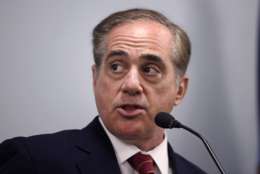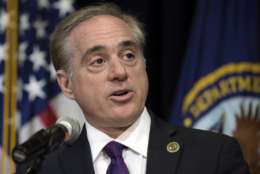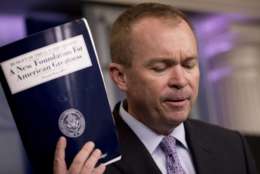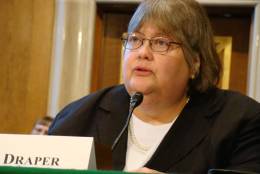health care
-
Veterans Affairs Secretary David Shulkin said the agency is not privatizing, but additions to the Choice program will help create more comprehensive programs and partnerships to provide veterans with the best care.
August 07, 2017 -
Congress spent weeks crafting and voting on various measures to reform the American health care system with, so far, nothing to show for it, but there are still plenty of important measures awaiting lawmakers attention, and not many days left to tackle them. These include the annual Defense authorization bill, emergency funding for the VA and finding a way to keep the government open past Sept. 30. David Hawkings, senior editor at Roll Call, brings Federal Drive with Tom Temin up to speed on happenings on Capitol Hill.
August 01, 2017 -
Dr. David Shulkin inherited a Veterans Affairs Department only partway through a badly needed transformation. As secretary, he's got a lot of tough constituents — Congress, a demanding president, veterans groups and veterans themselves. Shulkin discussed a number of pressing matters on Federal Drive with Tom Temin, starting with the consequences of new funding for the Veterans Choice program just approved by Congress. It extends veterans' ability to obtain health care outside of the VA system. Just don't call it privatization.
August 01, 2017 -
Sen. John McCain's (R-Ariz.) surgery delayed a Senate vote on the latest Republican version of health care policy reform. But a few other things are happening on Capitol Hill, like a group of House members trying to get an omnibus sending package for 2018. David Hawkings, senior editor at Roll Call, has the latest on Federal Drive with Tom Temin.
July 18, 2017 -
A Medicare program called hospital value-based purchasing has the goal of rewarding hospitals that give high quality care at lower costs. But, quite a few hospitals have been receiving bonuses for efficiency even though the care they give is sub-par, according to findings from the Government Accountability Office. Joining me with more, James Cosgrove, the GAO's director of health care issues, shares the details on Federal Drive with Tom Temin.
July 13, 2017 -
Ethical people don't need a code of ethics, while crooks and cheaters don't care whether you have one.
June 20, 2017 -
Have you read so much about the proposed 2018 budget that you feel like your head will explode? Do you just want to know which provisions would affect you, but are having trouble separating it from all the rest? Federal News Radio has boiled it all down to some key takeaways all federal employees need to know. If you read nothing else about the budget, read this.
May 30, 2017 -
The Trump administration's Defense budget proposal envisions billions of dollars in savings from more oversight on IT, base closures, health care reforms and plane tickets.
May 24, 2017 -
The Government Accountability Office found that the Veterans Affairs Department doesn't have a very effective process for aligning facilities and capital investments. Debra Draper, director of health care issues at the GAO, shares the details on Federal Drive with Tom Temin.
May 18, 2017 -
A poll by the American Psychological Association says morale at federal offices is bad and getting worse. Senior Correspondent Mike Causey wants to know what it's like in your office.
May 16, 2017 -
Does the ACA, aka Obamacare make you sick or are you afraid it’ll be replaced by President Trumps proposal? Senior Correspondent Mike Causey says get a fed job.
May 15, 2017 -
“The Children’s Inn is a place like home,” said Jennie Lucca, CEO of the Children’s Inn at NIH. She sat down with Women of Washington to share her story.
April 18, 2017 -
House Republican leaders are trying to wrangle enough of their own members to approve the final version of the American Health Care Reform Act, the bill intended to “repeal and replace” the Affordable Care Act. David Hawkings, a senior editor at Roll Call, joined Federal Drive with Tom Temin to discuss what could happen if the bill makes it to the Senate floor and the President eventually signs.
March 22, 2017 -
According to cybersecurity firm TrapX, cyber attacks on health care organizations rose 39 percent last year with 93 major incidents. And a big way in is through unprotected medical device. Federal Drive with Tom Temin asks Anthony James, vice president of marketing at TRAPX Security, how vulnerable is the Veterans Affairs Department or TRICARE?
January 11, 2017 -
The nation's veteran population is gradually becoming more female. But it's unclear whether the Veterans Health Administration is equipped to deal with the particular medical needs of female vets. It's got the policies all right, but not always the facilities. Or the providers. That's according to a new assessment by the Government Accountability Office. Randy Williamson, director of health care issues at GAO, has more on Federal Drive with Tom Temin.
December 14, 2016














